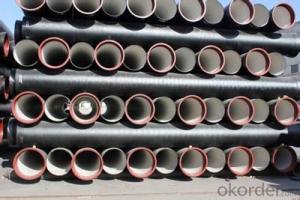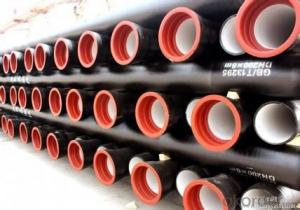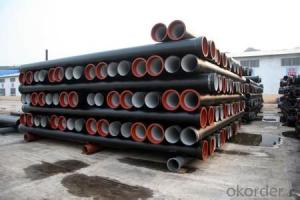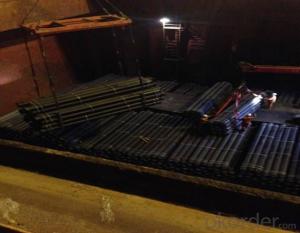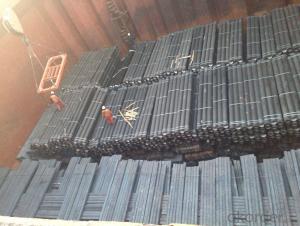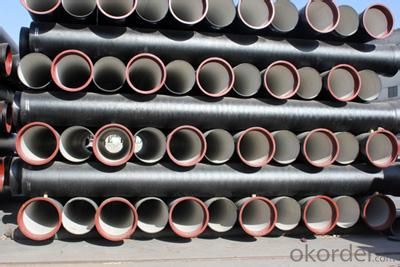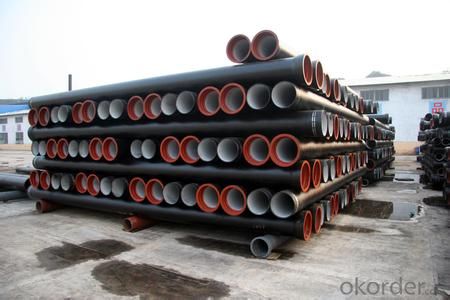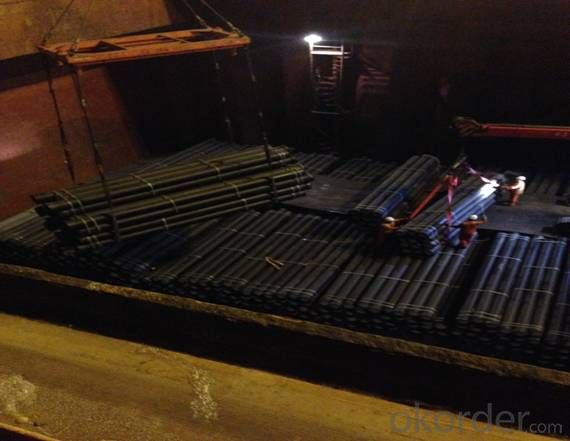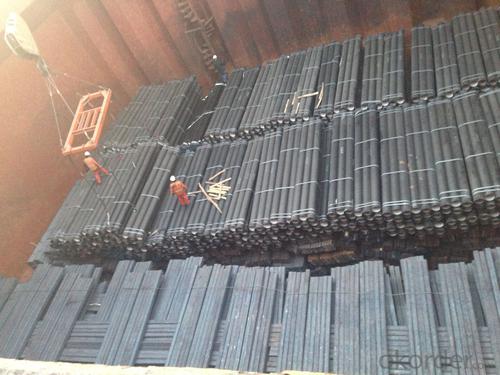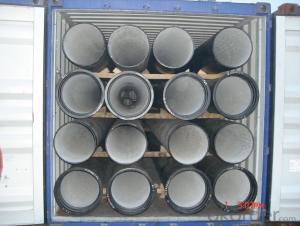DUCTILE IRON PIPE K8 DN300
- Loading Port:
- China Main Port
- Payment Terms:
- TT OR LC
- Min Order Qty:
- -
- Supply Capability:
- -
OKorder Service Pledge
OKorder Financial Service
You Might Also Like
Ductile Iron Cast Pipe is without any defects compare with tradition casting tech, which has many advantages particularly as follow:
(1) High density. In the "vertical upward casting" process, the melt iron of centre liquid column in center crystallizer is continuously feeding for volume shrinkage caused by condensation tube at outer circumference , which lead to be free of shrinkage porosity.
(2) High purity. When melt iron pouring, the mixed impurities such as gas, dross, sand grain which are lighter than melt iron could be eliminated at furnace mouth, its impossible to enter into the crystallizer through the channel, so the melt iron into the crystallizer is very pure.
(3) Strength with toughness. The cooling speed provided by continuous crystallizer is 30 times than sand casting and 5 times than centrifugal casting, and doesn't produce white iron, the eutectic cell volume of continuous cast iron is one eighth to one tenth compare with traditional cast iron. The density of graphite nodule in ductile iron can reach 300-700 pcs/mm2. Therefore, all reason above improve the strength and toughness of continuous cast iron.
(4) Free machining. The high speed cooling make the hardening phase (such as boride, steadite) not appear like reticular, massive or thick, but diffuse like fish bone and pane in shape, moreover, there are tiny graphite flakes inlaid hardening phase. It's free machining in BrinellHardness the range of 250-300HB. However, the Brinell Hardness of 250 is top limit to common metal materials.
(5) Uniform composition of tube wall. The convection mixing of liquid column caused by marching type drawing in crystallizer make the composition of tube wall well-distributed, and concentration gradient very little.
(6) High productivity. To the wall thickness of tube under 10mm, the speed of continuous casting is 1 meter/min, to the wall thickness of tube under 20mm, the speed of continuous casting is 0.5 meter/min, which is high efficiency that centrifugal or other casting tech couldn't reach.
- Q: Can ductile iron pipes be used for underground fuel storage systems?
- Underground fuel storage systems can utilize ductile iron pipes, which offer superior strength, durability, and flexibility compared to traditional cast iron pipes. These properties render ductile iron pipes suitable for a range of applications, including underground fuel storage. An important advantage of ductile iron pipes is their resistance to corrosion, a crucial factor for underground storage systems that may encounter various fuels and chemicals. Furthermore, their high tensile strength and resilience enable them to withstand external pressure and loading, ensuring the integrity and safety of the underground storage system. Additionally, ductile iron pipes boast a long lifespan, typically lasting for several decades. This longevity makes them a cost-effective option for underground fuel storage systems, as they can bear the weight of stored fuel and potential ground movements while maintaining the structural integrity of the system over time. Nevertheless, it is worth noting that the appropriateness of ductile iron pipes for underground fuel storage systems may depend on other factors, such as local regulations, soil conditions, and the specific fuel being stored. To ensure compliance and safety, it is always advisable to seek guidance from professionals and adhere to relevant guidelines when designing and installing such systems.
- Q: Are ductile iron pipes suitable for horizontal directional drilling (HDD) installations?
- Ductile iron pipes are indeed suitable for horizontal directional drilling (HDD) installations. Renowned for their robustness and durability, ductile iron pipes prove to be an exceptional option for HDD projects. The process of HDD entails creating a horizontal tunnel underground and inserting a pipe through it. This can be quite challenging due to the immense forces exerted on the pipe during the installation. Nevertheless, ductile iron pipes have the capability to endure these forces and maintain their structural integrity, thus ensuring a successful HDD installation. Furthermore, ductile iron pipes possess outstanding resistance to corrosion, making them suitable for a wide range of soil and environmental conditions frequently encountered during HDD projects. In conclusion, ductile iron pipes possess the necessary characteristics to withstand the demanding conditions of HDD installations and remain a dependable choice for such applications.
- Q: Can ductile iron pipes be used in high-temperature applications?
- Ductile iron pipes are capable of being utilized in applications that involve high temperatures. Unlike PVC or HDPE pipes, ductile iron pipes possess a higher melting point, rendering them suitable for transporting fluids at elevated temperatures. The material properties of ductile iron, encompassing its strength, toughness, and ability to withstand thermal stress, allow it to endure higher temperatures without distorting or failing. Nevertheless, it is worth noting that the precise temperature threshold for ductile iron pipes may vary depending on factors such as the grade of ductile iron employed, the pressure of the fluid being conveyed, and the duration of exposure to elevated temperatures. Consequently, it is imperative to consult the manufacturer's specifications and guidelines in order to ensure the appropriate selection and installation of ductile iron pipes for high-temperature applications.
- Q: What is the lifespan of ductile iron pipe?
- The lifespan of ductile iron pipe can vary depending on various factors such as the quality of the pipe, the environment in which it is installed, and the maintenance practices followed. However, on average, ductile iron pipe has a lifespan of around 80 to 100 years. This long lifespan can be attributed to the inherent durability and strength of ductile iron, which allows it to withstand high pressure, external loads, and environmental conditions. Additionally, ductile iron pipe is often coated with protective linings such as cement mortar or epoxy to further enhance its resistance to corrosion and extend its lifespan. Regular inspections and maintenance can also contribute to prolonging the lifespan of ductile iron pipe by identifying and addressing any potential issues in a timely manner. Ultimately, with proper installation, maintenance, and care, ductile iron pipe can provide reliable and long-lasting service for several decades.
- Q: How are ductile iron pipes repaired if they get damaged?
- Ductile iron pipes are typically repaired using various methods depending on the extent of the damage. Common repair techniques include spot repair, where damaged sections are cut out and replaced with new pipe sections, and trenchless repair methods such as pipe lining or pipe bursting. These methods minimize disruption and excavation while ensuring the structural integrity of the pipe is restored.
- Q: Are ductile iron pipes resistant to alkaline attacks?
- Yes, ductile iron pipes are generally resistant to alkaline attacks. Ductile iron is known for its durability and corrosion resistance, making it suitable for various applications including water and wastewater systems. Alkaline substances, such as high pH levels in water or chemicals, can potentially cause corrosion in certain metals, but ductile iron has been specifically designed to withstand these conditions. Its composition, including the addition of alloying elements like nickel and chromium, enhances its resistance to alkaline attacks. Additionally, ductile iron pipes are often lined with protective coatings, such as cement mortar or polyethylene, further enhancing their resistance to alkaline substances. However, it is important to note that the specific resistance of ductile iron pipes to alkaline attacks can depend on factors such as the concentration and duration of exposure to alkaline substances, as well as the presence of other corrosive agents. Therefore, it is always advisable to consult with manufacturers or industry experts to ensure the suitability of ductile iron pipes for specific alkaline environments.
- Q: Can ductile iron pipes be used in contaminated groundwater systems?
- Contaminated groundwater systems can indeed utilize ductile iron pipes. Renowned for their strength and durability, ductile iron pipes are versatile and applicable in various settings, including water and wastewater systems. These pipes possess corrosion-resistant properties that safeguard against both internal and external corrosion, thus ensuring reliable water transportation, even in the presence of contaminated groundwater. When addressing contaminated groundwater, it becomes imperative to assess the extent and nature of the contamination. Ductile iron pipes exhibit resistance to numerous common chemicals typically found in groundwater, including specific acids and alkalis. However, in instances of severe or specific chemical contamination, it may be necessary to explore alternative pipe materials that offer superior resistance to those particular substances. Moreover, the proper installation and maintenance of ductile iron pipes are vital for their long-term performance within contaminated groundwater systems. Regular inspections, cleaning, and the use of suitable protective coatings can effectively mitigate any potential risks associated with contamination. In conclusion, ductile iron pipes can be effectively employed in contaminated groundwater systems, provided that the level and type of contamination fall within acceptable limits and appropriate installation and maintenance practices are observed. It is always advisable to seek guidance from experts and consider local regulations and guidelines when determining the suitability of pipe materials in specific groundwater systems.
- Q: Is the spigot and socket connection of the ductile iron tube reversed?
- The whole process is formed by the radial compression of the pipe blank and the stretching process of the branch pipe. Different from the hydraulic bulging three, the metal of the three way joint pipe is compensated by the radial movement of the tube blank, so it is also called radial compensation process.
- Q: What is the maximum temperature that ductile iron pipes can handle?
- The maximum temperature that ductile iron pipes can handle depends on various factors such as the specific grade of ductile iron, the specific application, and the duration of exposure to elevated temperatures. Generally, ductile iron pipes have a maximum recommended operating temperature of around 400-450 degrees Fahrenheit (205-232 degrees Celsius). However, it is important to consult the manufacturer's specifications and guidelines for the specific product being used as different grades and manufacturers may have slightly different temperature limits. It is also crucial to consider the thermal expansion and contraction characteristics of ductile iron pipes to avoid any potential issues in high-temperature environments.
- Q: Classification of cast iron pipes
- Sand casting centrifugal cast iron pipe:The sand casting centrifugal cast iron pipe is made of gray cast iron. It is suitable for the transportation of pressure water such as water and gas.
Send your message to us
DUCTILE IRON PIPE K8 DN300
- Loading Port:
- China Main Port
- Payment Terms:
- TT OR LC
- Min Order Qty:
- -
- Supply Capability:
- -
OKorder Service Pledge
OKorder Financial Service
Similar products
Hot products
Hot Searches
Related keywords
